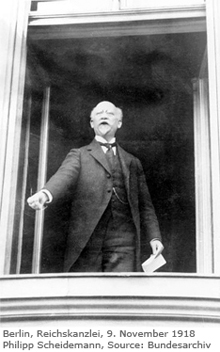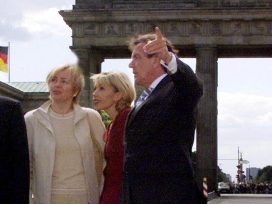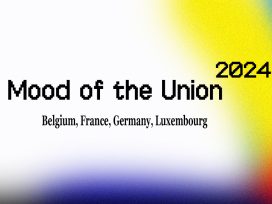In his “Children’s Hymn” of 1950, Bertolt Brecht, back in East Berlin after exile, revealed an unexpected patriotism: “So that a good Germany flowers / Like many another good country. […] And because we are tending to this land, / May we love and protect it; / And may it seem to us the dearest, / Just as to others their own land seems.” A great deal stood in the way of Germany’s recognition by other nations, however, including a day of infamy: the 9 November 1938. “So that the peoples do not turn pale / Before us as before a bird of prey / But that they reach out their hands / To us as to other peoples ” – that was probably only possible after 9 November 1989.
This November day is marked by coincidence. On 9 November 1918, the first German Republic was (temporarily) declared; exactly four years later, Hitler staged a putsch against it (without success, for the time being). The Reichskristallnacht or Night of Broken Glass in 1938 was linked to both and signalled the passage from the persecution and expulsion of the German Jews to their mass extermination across Europe. On 9 November 1989, the division of Germany – a result of the collapse of the Third Reich – came to an end. “Were 9 November not a date burdened by appalling memories,” wrote the journalist Peter Bender, “we would have to celebrate it as the day of German unity.”

What prevents this: respect for the victims or superstition? Or the myth: “It is the evil deed that afterwards begets more iniquity like its own breed” (Aeschylus)? At any rate, historical turning points, when evoked on days of remembrance both official and otherwise, assume an afterlife that itself can alter the course history. Traumatic memories, which have meanwhile replaced military victories or foundational revolutionary triumphs (the fourth of July, le Quatorze Juillet) as anniversaries, are able to contaminate later events occurring on the same day to such an extent that commemoration of them seems impossible.
In place of 9 November, Germans commemorate 3 October, on the last occasion – as was widely remarked – as lightheartedly and as privately as they used to mark 17 June, the anniversary of the crushing of the workers’ uprising in Soviet occupied Germany in 1953, which in West Germany was oddly made into “a day for hiking and bathing”. The 3 October marks the signature of the treaty of 1990 that officially united Germany, although this had de facto been completed six months before when people had voted with their feet.
It was a complete coincidence that the Wall fell on 9 November. When he uttered the historic sentence that would terminate the GDR, the Central Committee secretary for information, Günter Schabowski, almost certainly wasn’t thinking about the Reichspogromnacht – the commemoration of which now belonged to the antifascist repertoire, after decades of neglect. Having announced the decision to ease travel restrictions to the West, Schabowski was asked when this would take effect; rummaging through the papers on his desk, he replied “immediately”.
That, then, was probably “the greatest revolution of all”, as Theodor Wolff put it on 9 November 1918. It is said that the Germans don’t do revolutions gladly, but when then preferably on grey days in November. It was on one such morning that the majority Social Democrats, faced with the creation of workers and soldiers’ councils, declared a general strike. Friedrich Ebert and Philipp Scheidemann resigned from the government of Max von Baden and, after lengthy hesitation and bloodshed and so as to prevent a Bolshevik revolution, finally seized power. Ebert became the chancellor of a “German Republic” famously declared by Scheidemann, without having conferred with Ebert, from the balcony of the Reichstag at around 2 o’clock in the afternoon (the scene was later reconstructed for the benefit of photographers). Two hours later, Karl Liebknecht, the leader of the Spartacists, proclaimed the “free socialist republic of Germany” from the balcony of the Berlin Stadtschloss.
After Wilhelm II had gone into exile in Holland, Ebert made it his foremost goal to introduce a tidy transition by means of a constitutional assembly. “Wherever possible, continuity had priority over renewal” (Heinrich A. Winkler) – and this included property relationships, the military and the civil service. The empire remained intact, hundreds of thousands of soldiers returned home in orderly fashion, and economic life revived. Above all, Germany was from now on a parliamentary democracy, as befitted its degree of modernization and industrialization.
The reparations imposed by the treaty of Versailles had loaded the country with a heavy burden, and the November Revolution brought neither a social nor a moral turnaround. Authoritarian traditions such as those portrayed in Michael Haneke’s film The White Ribbon persisted; civil servants and members of the military, large-scale landowners and capital interests, along with a large part of the intelligentsia, all retained a distance to the West. Democracy without (enough) democrats fell prey to the “stab in the back myth”, according to which the German Empire, unbeaten in the field, was defeated by the “novembrist criminals” on the home front.
This distortion of 9 November 1918 (and the uprising in Bavaria two days earlier) had a “mobilizing function” (Hans Mommsen) for Adolf Hitler’s march on the Munich Feldherrenhalle five years later. Posters put up the day before announced Hitler’s intention to put an end to the revolution; backed by radical circles in the army, he wanted to follow Mussolini’s example and “march on Berlin”. The police had little difficulty in bringing the uprising under control, killing sixteen of its members, who from then on were referred to as “blood witnesses”. But what began as a Bavarian farce would, ten years later, repeat itself as a tragedy of world historical proportions: namely the seizure of power of the “old guard”, for whom 9 November, stylized as heroic defeat, marked the anniversary of the movement.
The failed putsch of 1923 was a last attempt to do away with the hated republic by military means; from then on, Hitler, recognized as the leader of the national revolution in 1925, changed tactics. After putting Weimar under sustained ideological bombardment, power would be seized legally. Those most enflamed were the radical opposition to the “November revolution”; after 1933 the “old guard” gathered every 9 November at the Munich Beer Hall for the official anniversary. In 1938, Goebbels took this as an opportunity to destroy more than 140 Jewish synagogues and Jewish property, at the cost of millions of Reichsmark. Around 400 Jews were lynched or committed suicide.
Putting a mob of stormtroopers in civilian clothing was supposed to give the impression of spontaneous popular anger, an act of revenge for the assassination of the German diplomat Ernst Eduard von Rath by the young Polish Jew Herschel Grynzspan in Paris. However, the fact that ordinary Berliners referred to the pogrom as “the night of broken glass” indicated that the “comrades”, who were antisemitic to the core and who stood to profit from Aryanization, did not enjoy such broad support. Gestapo spies reported significant reservations, so that the task of stepping up the persecution of the Jews all the way to the Holocaust was delegated to the SS as a secret commando. The 9th November would have been a genuine turning point only if broader circles had positioned themselves against Hitler and the NSDAP.
The four November dates no longer have special status in historical research. In questions of the legacy of the Weimar Republic or the radicalization of the Nazi dictatorship and the collapse of the GDR, “structuralist” interpretations have come to the fore that attribute less significance to caesuras and turning points, regardless of how dramatic they may have seemed and their continuing prominence in collective memory. Structuralist approaches instead hold that no revolution in the proper sense took place in November 1918 and that the decrepit GDR did not end with a revolution. Of structural and intentional importance was rather the obdurate revisionism of the Nazi movement and the self-fulfilling prophecy of its negative November myth, which in the end would drag both its inventors and functionaries down with it.
At the same time, historians shifted their focus from the reconstruction of the November events to secondary analysis of the symbolic meaning and political and cultural function of these lieux de mémoire and commemorative anniversaries. 9 November began to be seen in relational terms and in the context of other caesuras such as 30 January 1933 and 8th May 1945. Ignatz Bubis once responded to the suggestion that 9 November be elevated to a national holiday by saying that the fall of the Wall in 1989 wouldn’t have been necessary had Germany not been divided after 1945, and that the November pogroms would have not taken place had there been no seizure of power in 1933.
Celebrating 9 November is out of the question not simply because of the legacy of the day itself, but above all because of the unfortunate political treatment it received in the post-war successor states of the “Third Reich”. The genuine horror at the Nazi crimes felt immediately after war gave way in the 1950s to stubborn repression and in the 1970s to awkward and finally routinized ritualization of memory. The historian Harald Schmid has reconstructed in minute detail the memory of the “day of guilt” in the two states. While major differences did exist between an imposed and a relatively freely evolving memory culture, there were also significant similarities and convergences. In all the occupied zones, commemoration of 9 November 1938 was initially characterized by the sense of “collective guilt” (Theodor Heuss); the victims’ associations were central in keeping the memory alive during the immediate post-war period. In both German states, antisemitism then began to re-emerge, in the West openly assuming features of national socialist revisionism, in the East in connection with the late-Stalinist purges (e.g. the expulsion of politburo member Paul Merker from the East German Communist Party for being a “Zionist agent”).
The emergence of an official day of commemoration had ambiguous consequences: on the one hand, the socialization of collective shame prevented a second wave of revisionism, on the other hand, a vague rhetoric of “outrage” and a contrived insistence on “reconciliation” came to the fore. Initially, the day of commemoration was promoted by only a handful of actors: the Jewish communities and the Central Council of German Jews, the Christian-Jewish societies, the Association of Victims of the Nazi Regime, the trade unions and the Protestant and Catholic Churches. The ceremonies, which almost always followed the same pattern, generally failed to give survivors of the pogroms an opportunity for mourning, be it individual or collective, nor were former Nazi criminals and their supporters forced to closely confront what had happened.
Writing in 1988, the historian and curator Cilly Kugelmann dryly summed up this skewed interaction: “The annual commemoration of Kristallnacht involves German politicians being invited by Jewish communities to make speeches recollecting the murders committed in the name of the ‘German people’. But on a day recalling the politics of extermination, shouldn’t it be Jewish citizens who are invited by German politicians?” She also rightly criticized the fact that official anniversaries were “more the expression of mourning for the irrecoverable concept of Jewish-German co-existence than the incomprehensible destruction of the European Jews”. In the GDR, official recognition of the existence of Jewish life was long in coming and largely thanks to the Protestant Church. In environmentalist and pacifist milieus, meanwhile, a convergence of commemoration around 9 November 1938 prepared the ground both mentally and atmospherically for the fall of the Berlin Wall on the same day in 1989.
In the FRG, breakthroughs in collective commemoration of the November pogrom – initially referred to as the Reichskristallnacht, which had been the Nazi term for it, and after 1988 the Reichspogromnacht, a more politically correct variant despite the compound being an historical contradiction – happened in 1963, 1978 an 1988. This was primarily a result of the simple fact that the November pogrom was commemorated as mechanically as round-number anniversaries in the private sphere. However, generational dynamics also played a role, with younger people campaigning for an end to the “collective silence” (Hermann Lubbe) and the assumption of responsibility. Social and political conflicts also added to the controversy around commemorations. In the 1960s, these centred around demands for the liberalization of society as a whole and the reappraisal of the Nazi past as one aspect of this; in the 1970s, there was scepticism about the “spiritual-moral change” announced by Helmut Kohl and heavy debate around the alleged “sanitization of the past”; in the 1980s, a wave of violent rightwing extremism was seen as a remnant of Nazism.
The initial disinterest and subsequent overreaction of the radical left in the late 1960s was another factor in the peculiar afterlife of 9 November (1938). The generation of 1968 largely omitted the history of the persecution of the Jews from their concept of fascism and after the Six Day war joined the anti-Zionist camp, declaring their solidarity with the militant Palestinian cause. The attempted bombing of the Jewish community centre in Berlin on 9 November 1969 by a group centred around the former communard Dieter Kunzelmann, calling themselves the Tupamaros of West-Berlin, seems almost bizarre. One political sympathizer defended the attack as such: “Every commemorative ceremony in West Berlin and in the FRG conceals the fact that the Kristallnacht of 1938 is repeated daily by the Zionists in the occupied territories, in the refugee camps and in Israeli prisons. The same Jews that were driven into exile by fascism have themselves become fascists and, in league with American capital, are now trying to wipe out the Palestinian people.” What would otherwise have been the biggest massacre of Jews in Germany since 1945 was hindered only by a faulty fuse. It has only recently come to light that the bomb was placed by a minor activist member of the Socialist German Student Union. However, most appallingly is that the bomb itself was probably provided by an undercover agent for the German secret services, Peter Urbach. Had Heinz Galinski and other representatives of the Jewish community been harmed, the German government of Willi Brandt would have found itself having to explain to the world why a concerted action between the “anti-fascist” Left and the organs of the state had been carried out on the anniversary of the November pogrom.
Since the 1970s, the question of how commemoration was to happen (and what was to remain un-commemorated) was subject to a combination of strict official supervision and a dynamic of exaggeration. Grief, shame and responsibility per se began to count less than the media evaluation of the performance of these emotions on the commemorative stage. Despite aiming at dramatization and contemporaneity (particularly with respect to rightwing violence from the 1990s onwards), commemorative ceremonies tended to contribute more to a desensitization. For subsequent generations, it was almost impossible to obtain an undistorted view of the four November anniversaries.
Gaffes were also numerous. One famous example was the song Kristallnacht by the Cologne rock band BAP, which reached the top of the German charts in 1982. According to bandleader and songwriter Wolfgang Niedecken, the lyrics came about as a result of a somewhat vague attitude of protest while the band were in Greece. The band’s fans couldn’t help but be swept along by the music, so that, as Niedecken himself put it: “Everyone sings along and nobody thinks about what the song’s really about. I can’t blame anybody. After all, people come to a concert to listen to music and not to contemplate the pogrom of the Jews with me.”
This wasn’t the case for some of those listening to the speech given by the president of the West German parliament Philipp Jenninger on the fiftieth anniversary of the pogrom in 1988. The speech has gone down in memory as the most serious misjudgement ever made on a 9 November anniversary. In retrospect, Jenninger went wrong not so much in what he actually said but in the form of the speech, which caused an uproar before it had even ended. Whether the negative reactions to Jenninger’s speech were calculated or the result of party political conditioning – he was considered notoriously conservative – is debatable. The fiftieth anniversary ceremony was overshadowed by controversy from the outset. Heinz Galinski, president of the Central Council of German Jews, had first been scheduled to address the West German parliament. However, Galinski then dared to meet GDR leader Erich Honecker to discuss the possibility of establishing 9 November as a bi-national day of remembrance. When he mentioned the idea to Jenninger, the parliamentary president promptly disinvited Galinski and decided to give the speech himself.
This could have been an opportunity for a German to finally openly acknowledge the November pogroms and to humbly ask not for redemption or reconciliation but for forgiveness. Instead, the ceremony de-railed halfway through, when the rhetorically inept Jenninger phrased his hermeneutic empathy with the motives of the German population in a way that (with a degree of ill-will) could be construed as approval. Numerous MPs left the chamber and the press immediately declared a scandal.
The historian Lutz Niethammer summed up the unfortunate incident aptly: “After reading the speech, you noticed that Jenninger had barely said anything wrong. However he said everything wrong.” Abandoned by his political friends, Jenninger hurriedly resigned. Oddly enough, his speech is still cited as an expression of a misconceived approach to confronting the legacy of Nazism – as if, seventy years later, Germans had put politics aside and learned to face up squarely to the past.
These difficulties lie in the monstrosity of the crimes and in the zigzag course of the “quadruplicity” of 9 November. As such, it would make an ideal national day of remembrance. Yet the challenge posed by 9 November has been deflected by two other dates: 3 October, the day Germany celebrates unification; and 27 January, which stands for the stigma that can never be lifted. The Europeanization of memory and commemoration cannot alter this fact. What it can do, however, is to contextualize both German antisemitism and the revolutionary uprisings at the beginning of the twentieth century and thus emphasize the convergence of industrial societies since the nineteenth century.
There is no longer a need to pale before Germany as if before a bird of prey; the country is surrounded by friends and enjoys universal recognition. However, it has yet to develop a form of patriotism that is open to Europe and the world. Brecht’s “Children’s Hymn”, set to music by Hanns Eisler and praised by Iring Fetscher for its beauty, rationality and self-reflexivity, was the deliberate counterpart both to the Deutschlandlied of Hoffmann von Fallersleben, whose third verse (“unity and justice and freedom”) became the West German anthem in 1950, and to the East German national anthem, Johannes R. Becher’s “Risen from Ruins” – although all three lyrics can be sung to the melodies of the others. After the seemingly impossible events of 9 November 1989, it might at least have been a good idea to choose this beautiful song as the national anthem.







